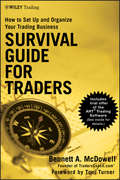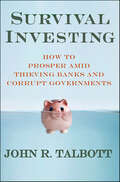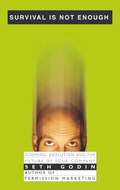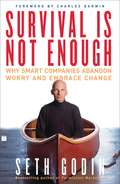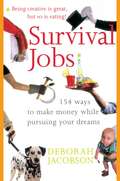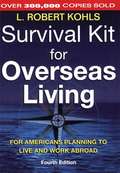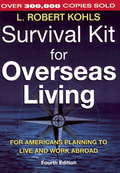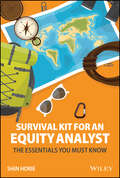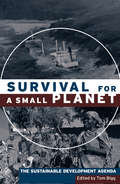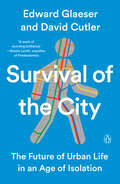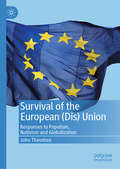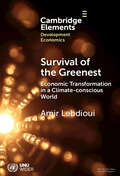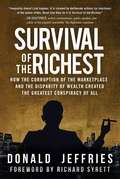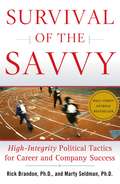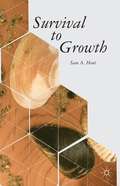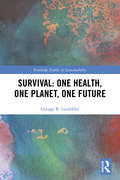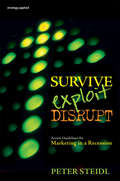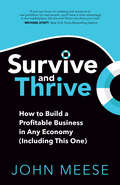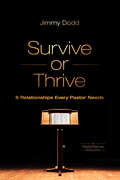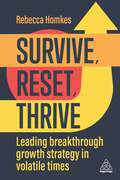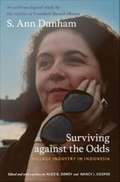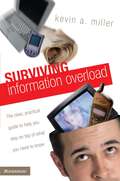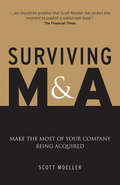- Table View
- List View
Survival Guide for Traders
by Bennett A. McdowellThe must-have guide for anyone considering entering the exciting world of trading from home The biggest stumbling block for people looking to launch their own trading businesses from home is a failure to understand the complexities of the "back office" operations needed to be successful. Survival Guide for Traders is here to help. Packed with strategies for building a successful home trading business, and featuring answers to questions most up-and-coming traders would never think to ask, Survival Guide for Traders is required reading for anyone who wants to start and sustain a trading business from home. Explains how to create a trading business plan, set up an office, implement a trading system, use margin, deal with legal and financial issues, and keep appropriate records Examines the opportunities and challenges of handling a home-based trading business Details the process of setting up and organizing your trading business Includes a comprehensive "Trading Business Plan Template" that you can customize Written by Bennett McDowell, a highly regarded trader and trainer of traders The book for anyone even thinking about entering the exciting world of trading, the Survival Guide for Traders offers practical solutions that anyone can use in order to build a lasting, thriving home trading business.
Survival Investing: How to Prosper Amid Thieving Banks and Corrupt Governments
by John R. TalbottA startling look at how unsustainable debt levels, in the US and around the world, are endangering many standard investments, and what people need to know to protect their money Most individuals and institutions hold the preponderance of their investments in common stocks, corporate bonds, mutual funds, index funds, muni bonds, money markets, bank CDs, and Treasury securities. But these conventional investments will not do well in a world dominated by corrupt, debt-laden governments and thieving bankers, brokers and middlemen. Finance guru John R. Talbott, prescient predictor of the financial crisis and the housing market crash, offers a new paradigm for the coming economic reality. He shows how the recent housing collapse and global economic crisis left governments of the world with enormous annual operating deficits at a time when the banking system continues to struggle with bad debts and requires additional government guarantees and bailouts. Add the fact that growth is constrained because the first wave of the baby boom is hitting 65 and consumers are still loaded with unsustainable levels of debt, and you have a recipe for an economic catastrophe. In this uncertain atmosphere, Talbott offers clear strategies on what you can do to protect your investments and your family. Among the global dynamics covered are: *the low-wage threat of China and India *the legitimacy of gold investing *the false security of diversification *the risks of sovereign debt . . . and why most economists are missing the boat.
Survival Is Not Enough: Shift Happens
by Seth GodinYou can't embrace change any faster...can't make time for the synergy training workshop...can't deal with one more change management seminar. So stop changing. Evolve. Evolution can be unleashed in your organization, effortlessly and gradually changing everything in its path. By teaching your company to "zoom" -- embrace change without pain -- you'll have a company that evolves and ultimately attracts people who drive it to evolve even faster. In up or down markets, for companies in any industry, embrace the organic approach detailed in Survival Is Not Enough and you will always outperform the competition. Here's practical advice on how to make the chaos we all must deal with an asset, not a threat.
Survival Is Not Enough: Why Smart Companies Abandon Worry and Embrace Chan
by Seth GodinYou can't embrace change any faster...can't make time for the synergy training workshop...can't deal with one more change management seminar. So stop changing. Evolve.Evolution can be unleashed in your organization, effortlessly and gradually changing everything in its path. By teaching your company to "zoom" -- embrace change without pain -- you'll have a company that evolves and ultimately attracts people who drive it to evolve even faster.In up or down markets, for companies in any industry, embrace the organic approach detailed in Survival Is Not Enough and you will always outperform the competition.Here's practical advice on how to make the chaos we all must deal with an asset, not a threat.
Survival Jobs: 118 Ways to Make Money While Pursuing Your Dreams
by Deborah JacobsonIn the first-ever guide to finding a satisfying job that will keep food on the table while you focus on your perhaps less lucrative dreams, Deborah Jacobson presents a detailed survey of employment possibilities that keep stressful money worries away and allow plenty of time for pursuing one's true calling in life. Survival Jobs proves that you don't have to wait tables while looking for your big break. With frank and funny advice from an author who has traveled the survival-job road, Jacobson introduces opportunities both on and off the beaten track that suit a wide variety of schedules, skills, and personalities. Survival Jobs includes: "Jobs for the CEO in You" (apartment manager, massage therapist, and other "be-your-own-boss" suggestions)"That's Entertainment" (from working as a personal assistant to performing at theme parks)"Nine to Five...Not" (clock in at the crack of dawn or the midnight hour as a limousine driver, a video-store clerk, or an airport employee)"You Gotta Have Heart" (jobs that satisfy the spirit and pay the bills: pet care, social work, children's entertainment). For each job, she describes:Duties and responsibilities, the pros and cons; Likely salary, necessary skills, and educational background; Ideas for getting started; Sources for contacts, including names and phone numbers in major cities.
Survival Kit for Overseas Living, 4th ed.: For Americans Planning to Live and Work Abroad
by L. Robert KohlsA straightforward handbook on the challenges of moving to a new country-including culture shock, stereotyping, misperceptions, and misunderstandings-Survival Kit for Overseas Living gives readers the tools needed to overcome the obstacles associated with overseas living. Those traveling abroad will be able to bridge cultural divides and openly explore the mysteries of culture.
Survival Kit for Overseas Living: For Americans Planning to Live and Work Abroad
by L. Robert KohlsFor over twenty years, travelers seeking exciting and rewarding adventures abroad have looked to Bob Kohls for advice and have made Survival Kit for Overseas Living one of the most popular books ever published on crossing cultures, buying over 300,000 copies. With this new edition, sojourners about to set out to live or work overseas will soon discover why Kohls’ experience and wisdom have stood the test of time. Kohls’ penetrating insights and practical strategies on how to avoid stereotypes, how to explore the mysteries of culture, and how values and different ways of thinking influence behavior make this an indispensable guide. To bridge the cultural divide—whether traveling alone or with a family, for business or education, whether staying a month or a lifetime—pack this guide first!
Survival Kit for an Equity Analyst: The Essentials You Must Know
by Shin HorieDiscover a one-of-a-kind blueprint to equity analyst success from an industry leader In Survival Kit for an Equity Analyst: The Essentials You Must Know, veteran analyst Shin Horie delivers a must-read, practical guide on the analysis of companies and industries. The book offers a guide to conducting industry-level analysis from a global perspective, with a particular emphasis on adjustments necessary for covering companies in emerging markets. Readers will also get: A robust background on the basic process flow of company analysis and valuation Guidelines for examining earnings drivers in major industries Tips on the qualitative profiling of companies and how to dig deeper to find nuance that financial statements don't express Perfect for early-career equity analysts themselves, as well as corporate managers who seek to understand how their organisations will be scrutinized and examined by finance professionals, Survival Kit for an Equity Analyst offers readers an insightful narrative on the necessary ingredients for success in this demanding field.
Survival for a Small Planet: The Sustainable Development Agenda
by Tom BiggFew scientific developments have given rise to as much controversy as biotechnology. Numerous groups are united in their opposition, expressing concern over environmental and health risks, impacts on rural livelihoods, the economic dominance of multinational companies and the ethical implications of crossing species boundaries. Among the supporters of the technology are those that believe in its potential to enhance food security, further economic development, increase productivity and reduce environmental pressures. As a result, countries - and sectors within countries - find themselves at odds with each other while potential opportunities for development offered by the use of biotechnology are seized or missed, and related risks go unmanaged. This book, a unique interdisciplinary collection of perspectives from the developing world, examines the ongoing debate. Writing for the International Centre for Trade and Sustainable Development, leading experts address issues such as diffusion of technology, intellectual property rights, the Cartagena Protocol, impacts of international trade, capacity building and biotechnology research and regulation. With the most recent and relevant examples from around the world, Trading in Genes offers the reader a single-volume overview of the connections between biotechnology, trade and sustainability that is both wide-ranging and thorough.
Survival of the City: Living and Thriving in an Age of Isolation
by David Cutler Edward GlaeserOne of our great urbanists and one of our great public health experts join forces to reckon with how cities are changing in the face of existential threats the pandemic has only accelerated Cities can make us sick. They always have—diseases spread more easily when more people are close to one another. And disease is hardly the only ill that accompanies urban density. Cities have been demonized as breeding grounds for vice and crime from Sodom and Gomorrah on. But cities have flourished nonetheless because they are humanity&’s greatest invention, indispensable engines for creativity, innovation, wealth, and connection, the loom on which the fabric of civilization is woven. But cities now stand at a crossroads. During the global COVID crisis, cities grew silent as people worked from home—if they could work at all. The normal forms of socializing ground to a halt. How permanent are these changes? Advances in digital technology mean that many people can opt out of city life as never before. Will they? Are we on the brink of a post-urban world? City life will survive but individual cities face terrible risks, argue Edward Glaeser and David Cutler, and a wave of urban failure would be absolutely disastrous. In terms of intimacy and inspiration, nothing can replace what cities offer. Great cities have always demanded great management, and our current crisis has exposed fearful gaps in our capacity for good governance. It is possible to drive a city into the ground, pandemic or not. Glaeser and Cutler examine the evolution that is already happening, and describe the possible futures that lie before us: What will distinguish the cities that will flourish from the ones that won&’t? In America, they argue, deep inequities in health care and education are a particular blight on the future of our cities; solving them will be the difference between our collective good health and a downward spiral to a much darker place.
Survival of the European (Dis) Union: Responses to Populism, Nativism and Globalization
by John TheodoreThe European Union (EU) has reached crisis point. Populist and Nativist forces are militating against years of austerity economics, distant elites, and a rising tide of migration. Despite the EU's shortcomings, this book seeks to determine the future of the EU, outlining how the institution can learn lessons from the elements that have plunged much of Europe into social, economic and political turmoil. This book argues for reform not revolution. By interviewing politicians, economists, representatives of national bodies and EU citizens, this book provides unique insights never before disclosed and makes a major contribution to current debates on the future of the EU and the Eurozone.
Survival of the Greenest: Economic Transformation in a Climate-conscious World (Elements in Development Economics)
by Amir LebdiouiThe pathways to economic development are changing. Environmental sustainability is no longer a choice but a necessity to maintain a competitive edge in the global economy. Just like in nature, where survival hinges on adaptation, this Element shows how nations adjust to -and take advantage of- the new dynamics of structural transformation induced by climate change. First, by analysing the uneven industrial geography of decarbonisation, the inadequate state of climate financing and rise of green protectionism, it demonstrates that the low-carbon economy stands to increase economic disparities between nations, unless action is taken. Then, by examining green industrial policies and their varied success, it explains how governments can still join the green industrialisation race. Finally, it examines how to adapt green industrial policy to different starting points, market sizes, productive structures, state-business relations dynamics, institutional layouts, and ecological contexts. This title is also available as Open Access on Cambridge Core.
Survival of the Richest: How the Corruption of the Marketplace and the Disparity of Wealth Created the Greatest Conspiracy of All
by Donald JeffriesSurvival of the Richest scrutinizes how the collective wealth of America has been channeled from the poor and middle class into the hands of a few elitists. American industry has been gutted, with wages and benefits stagnant or reduced, thanks to a disastrous trade deals, outsourcing, and the crippling of unions. The Occupy Wall Street movement, and the presidential campaigns of both Bernie Sanders and Donald Trump, reveals how more and more people who are struggling understand that the system is rigged against them. While Americans have been trained to direct their scorn at welfare recipients and the poor in general, a tiny handful of plutocratic elites have profited on an unfathomable scale, through corporate welfare and other perks. Unimaginable salaries and bonuses for the One Percent, contrasted by layoffs and reduced pay for the majority of the workforce, along with increasing calls for austerity measures and lowered standards of living, has become the “new normal” in America. Donald Jeffries argues that this record economic inequality is more than an unintended consequence of globalism. In Survival of the Richest, he shows how the consolidation of wealth may well prove to be the greatest conspiracy of all.
Survival of the Savvy
by Rick Brandon Marty SeldmanTwo of the nation's most successful corporate leadership consultants now reveal their proven, systematic program for using the power of "high-integrity" politics to achieve career success, maximize team impact, and protect the company's reputation and bottom line. Each day in business, a corporate version of "survival of the fittest" is played out. Power plays, turf battles, deceptions, and sabotages block individuals' career progress and threaten companies' resources and results. In Survival of the Savvy, Rick Brandon and Marty Seldman provide ethical but street-smart strategies for navigating corporate politics to gain "impact with integrity," helping readers to: Identify political styles at work through the Style Strengths Finder, and avoid being under or overly political Discover the corporate "buzz" on you, and manage the corporate "airwaves" Decipher unwritten company rules and protect yourself from sabotage and hidden agendas Build key networks to promote yourself and your ideas with integrity Learn to detect deception and filter misleading information Increase your team's organizational savvy, influence, and impact Gauge the political health of the company and forge a high-integrity political culture In addition, Survival of the Savvy helps individuals discover and overcome their own political blind spots and vulnerabilities. They learn step-by-step methods to avoid being underestimated or denied full recognition for their achievements. It shows them how to put forward their ideas and advance their careers in an ethical manner, with a high level of political awareness and skill. After reading this book, you will never have to say, "I didn't see it coming." Organizational savvy is a mission-critical competency for the complete leader. This timely and timeless book provides cutting-edge strategies and skills for surviving and thriving as you build individual and company success.
Survival to Growth
by Sam A. HoutSurvival to Growth explores human nature and illustrates how occupational goals and objectives can be achieved by applying a basic organizational approach while upgrading the skill level of each company employee.
Survival, Relevance, and Advantage: Why Environmental Thinking is the Key to Growth in Tough Times and Beyond
by Andrew WinstonIn tough economic times, everyone is faced with the challenge of how to allocate scarce resources, and sustainability might not seem like a top priority. Andrew Winston, however, argues that in a world faced with dire environmental challenges, greening your business may be the only path to survival, relevance, and competitive advantage. In this chapter, he outlines a green recovery framework that charts the way to building an organization that's sustainable in every sense of the word. This chapter was originally published as the conclusion to "Green Recovery: Get Lean, Get Smart, and Emerge from the Downturn On Top."
Survival: One Health, One Planet, One Future (Routledge Studies in Sustainability)
by George R. LueddekePlanet Earth has been here for over 4.5 billion years but in just two human generations we have managed to place our only 'home' at great risk. Many lessons from history have not yet been learned and new lessons may prove equally, if not more, difficult to take on board as we head deeper into the twenty-first century. This book highlights two of our greatest social problems: changing the way we relate to the planet and to one another, and confronting how we use technology (dataism) for the benefit of both humankind and the planet. Covering a wide range of key topics, including environmental degradation, modern life, capitalism, robotics, financing of war (vs peace) and the pressing need to re-orient society towards a sustainable future, the book contends that lifelong learning for sustainability is key to our survival. The author argues that One Health - recognising the fundamental interconnections between people, animals, plants, the environment - needs to inform the UN-2030 Sustainable Development Goals and that working towards the adoption of a new mindset is essential. We need to replace our current view of limitless resources, exploitation, competition and conflict with one that respects the sanctity of life and strives towards well-being for all, shared prosperity and social stability. Clearly written, evidence based and transdisciplinary - and including contributions from the World Bank, InterAction Council, Chatham House, UNESCO, World Economic Forum, the Tripartite One Health collaboration (UN Food and Agriculture Organization, World Organisation for Animal Health and World Health Organization), One Health Commission and more - this book cuts across sociopolitical, economic and environmental lines. It will be of great interest to practitioners, academics, policy-makers, students, nongovernment agencies and the public at large in both developed and developing nations.
Survive Exploit Disrupt
by Peter SteidlRecessions -- there may not be anything we can do to stop them, but we have plenty of choices when it comes to our response. During a recession too much time can be spent trying to guess what impact it may have, while too little time is spent exploring the strategic options available. Survive, Exploit, Disrupt addresses the need for companies to shift their strategic thinking during an economic downturn. As trends change and consumer behaviour becomes less predictable, companies that triumph over economic downturn fall into three categories: survivors, exploiters and disrupters. This book shows executives how to navigate their way through the many challenges a recession represents for their business, and capitalise on the opportunities these periods of upheaval present. Inside you'll discover: the drivers of change during a recession how to adapt to recessionary periods how to exploit growth opportunities and identify disruptive opportunities specific actions you can take to survive a recession. The result is a solid basis for recession-proof strategy that companies can implement to ensure that they survive the tough times.
Survive and Thrive: How to Build a Profitable Business in Any Economy (Including This One)
by John Meese“A step-by-step plan to help you reach more people, make sales, and enjoy more profit, regardless of what the ‘economy’ is doing.” —Ray Edwards, bestselling author of How to Write Copy That SellsDo you have a post-Covid plan for success? The pandemic is not the first event to utterly disrupt the business world, and it’s unlikely to be the last. John Meese, economist-turned-entrepreneur, CEO of Cowork.Inc, and host of the Thrive School podcast, is on a personal mission to eradicate generational poverty by helping entrepreneurs create thriving businesses that can endure through good times and bad, so that unexpected events are much less likely to pull the rug out from under you. With a conversational tone and anecdotes from dozens of successful entrepreneurs, John provides innovative marketing, sales, and finance strategies to build a profitable business that can succeed in any climate. Learn how to:Reach a broader audienceBuild a sales engine that greatly increases revenueUnlock higher profitsManage risk with healthy financial practicesand much more.“If you can focus on creating real solutions to real problems for real people, you’ll have a clear advantage in the marketplace. Survive and Thrive can show you how.” —Michael Hyatt, New York Times–bestselling author of The Vision Driven Leader
Survive or Thrive
by Jimmy DoddIntroducing the PastorServe Series from David C Cook, a line of resources developed to stem the tide of pastoral burnout and crisis. In Survive or Thrive Jimmy Dodd reveals that the majority of pastors are not known--by anyone. They purposely isolate themselves from both staff and congregations so their insecurities, doubts, and failures aren't exposed. Yet confiding in the wrong person can be a dead-end at best and disastrous at worst. Former pastor Jimmy Dodd reveals how those in pastoral ministry can receive ongoing support, accountability, and restoration from a boss, counselor, trainer, mentor, coach, and good friend. Discover how you can move from surviving to thriving with the six relationships every pastor needs.
Survive, Reset, Thrive: Leading Breakthrough Growth Strategy in Volatile Times
by Rebecca HomkesUncertainty is here to stay. Rather than seeing it as an obstacle to overcome, integrate it into your strategic approach to invigorate your high-growth potential and outperform competition under any market condition.Strategy is about making choices around where to play and where not to play, how to win, how to allocate resources among competing priorities and, critically, what to do. All these choices must be made when you never know everything you would like to know. This book is about facing uncertainty head-on and then playing each round to not just survive, but thrive. Doing so only comes from the power move of executing a reset: the differentiated step where you embrace change, new insights and new opportunities to set your organization up for sustainable performance.Survive, Reset, Thrive is a playbook for leaders derived from the author's first-hand experience working with executive teams across industries from software, technology, retail, fashion and construction through to manufacturing. Drawing from over a decade of rich real-world experience, the author illustrates how to navigate the most complex strategic situations with a simple, executable approach. Rebecca Homkes explains how proactively to stabilize your business to withstand and grow through market shocks, reset your strategy to take account of new realities and thrive through uncertainty.
Surviving Against the Odds: Village Industry in Indonesia
by S. Ann DunhamRead the foreword by Mara Soetoro-Ng President Barack Obama's mother, S. Ann Dunham, was an economic anthropologist and rural development consultant who worked in several countries including Indonesia. Dunham received her doctorate in 1992. She died in 1995, at the age of 52, before having the opportunity to revise her dissertation for publication, as she had planned. Dunham's dissertation adviser Alice G. Dewey and her fellow graduate student Nancy I. Cooper undertook the revisions at the request of Dunham's daughter, Maya Soetoro-Ng. The result is Surviving against the Odds, a book based on Dunham's research over a period of fourteen years among the rural metalworkers of Java, the island home to nearly half Indonesia's population. Surviving against the Odds reflects Dunham's commitment to helping small-scale village industries survive; her pragmatic, non-ideological approach to research and problem solving; and her impressive command of history, economic data, and development policy. Along with photographs of Dunham, the book includes many pictures taken by her in Indonesia. After Dunham married Lolo Soetoro in 1967, she and her six-year-old son, Barack Obama, moved from Hawai'i to Soetoro's home in Jakarta, where Maya Soetoro was born three years later. Barack returned to Hawai'i to attend school in 1971. Dedicated to Dunham's mother Madelyn, her adviser Alice, and "Barack and Maya, who seldom complained when their mother was in the field," Surviving against the Odds centers on the metalworking industries in the Javanese village of Kajar. Focusing attention on the small rural industries overlooked by many scholars, Dunham argued that wet-rice cultivation was not the only viable economic activity in rural Southeast Asia. Surviving against the Odds includes a preface by the editors, Alice G. Dewey and Nancy I. Cooper, and a foreword by her daughter Maya Soetoro-Ng, each of which discusses Dunham and her career. In his afterword, the anthropologist and Indonesianist Robert W. Hefner explores the content of Surviving against the Odds, its relation to anthropology when it was researched and written, and its continuing relevance today.
Surviving Information Overload: The Clear, Practical Guide to Help You Stay on Top of What You Need to Know
by Kevin A. MillerThe barrage of emails, voicemail, web pages to scan, books to read, and magazines and newsletters to digest leave people increasingly feeling overwhelmed and out of control in dealing with information overload as society spins even faster. This book offers a brief, seven-chapter practical guide to the "capture" approach. It teaches the skills of point, focus, and shoot to help the reader become more productive and overcome mental fatigue. This is not a gimmick for "neat desk" people or an expensive system requiring purchase of multiple resources or practice of rigid exercises. This practical, quick-read book shows how people of any temperament can keep from drowning in the sea of information. Features include interviews and insights from national leaders plus charts, cartoons, worksheets, and creative exercises. The book is not about how to speed up but how to gain time and focus and purpose and the mental space to be creative. You don't have to finish the book but can read it selectively at different times depending on your current needs. Feel free to skim-read, tear out pages, email small sections to a friend, or read from back to front. The goal is that you come away with ideas and help. The four sections are: 1. Finding the information you need: and getting results from it. 2. Clearing information clutter: less is more. 3. Creating space to think: finding oasis amid overload. 4. Discovering bonus stuff: it doesn't cost you anything extra. This clear, practical guide will help you to: -Sort and organize information in less time -Make space to be creative -Find just the information you need when you need it -Move from frantic to purposeful -Keep growing over a lifetime.
Surviving M&A
by Ron Ashkenas Mitchell Lee Marks Philip Mirvis"For individual managers and employees, a merger or acquisition is not just a corporate strategy; it’s a personally disruptive—often traumatic—event. What C-suite executives and consultants euphemistically call “postmerger integration” is typically a period of tension, uncertainty, and even chaos. Workloads ramp up, as do pressure and stress. You may have to quickly adapt to unfamiliar policies, practices, and politics; work with strangers from different corporate or even national cultures; or report to new bosses who know nothing about your track record or ambitions. Meanwhile, there is no guarantee of a job with the resulting organization, let alone a long-term career. On average, roughly 30% of employees are deemed redundant after a merger or acquisition in the same industry."
Surviving M&A
by Scott MoellerPractical tips and real-world advice for thriving professionally in the midst of a major M&A dealAs a follow-up to his highly popular book Intelligent M&A, author Scott Moeller expanded the chapter on surviving a merger into an in-depth discussion of the subject. Surviving M&A offers practical advice for professionals who worry about their jobs while their organizations are embroiled in the turmoil of a merger or acquisition. Moeller not only shows readers how to keep their jobs safe, but how to turn lemons into lemonade and actually move up the corporate ladder during the chaos of M&A. For anyone in this precarious position, this book offers smart ideas and winning tactics.
